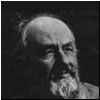|
|
|
Acknowledgments: Author thanks Galina Sergeeva at the Tsiolkovsky Museum in Kaluga and Elena Timoshenkova, a granddaughter of Konstantin Tsiolkovsky and a keeper of his home-museum, for their help in preparing this section. |
||||||||
|
Early biography of Konstantin Tsiolkovsky Konstantin Tsiolkovsky was born on September 17, 1857, in the village of Izhevskoe in the Ryazan Province, south of Moscow. Konstantin, or Kostya for short, was fifth out of 18 children in the family. The nearly complete loss of hearing in the childhood left bright and active Konstantin Tsiolkovsky impaired for the rest of his life. At the same time, biographers agree, the disability made him turn to books and stimulated his lifelong drive for learning. |
||||||||
 |
Konstantin Tsiolkovsky's work in Kaluga In February 1892, after 12 years of working as teacher in the small town of Borovsk, Tsiolkovsky was promoted to a new position, in the provincial capital of Kaluga. Tsiolkovsky would remain in Kaluga until his death in 1935, and it was there that he created the monumental body of work that secured his place as a prophet of the Space Age. |
|||||||
|
Konstantin Tsiolkovsky and Bolshevism Tsiolkovsky died famous and respected in his native land. During the Soviet period, Tsiolkovsky was portrayed as the brilliant scientist from the Russian heartland who struggled to get recognition from the ignorant and indifferent officials of czarist Russia. However documents made public in the post-Soviet Russia revealed that Tsiolkovsky’s path through the political and social cataclysms of revolutionary Russia was not as trouble-free as the official Soviet histories painted. |
||||||||
| Legacy
of Konstantin Tsiolkovsky
When mankind did in fact reach outer space, it was a Russian, Yuri Gagarin, who went first. But was it Tsiolkovsky’s ideas that got him there? Despite the fact that Tsiolkovsky's theories remained largely unknown in the West for decades, his influence on the first generation of Russian space engineers is unquestionable. With the collapse of the USSR, a full and honest discussion of Tsiolkovsky’s legacy, began at last. Freedom of speech in the post-Soviet Russia inevitably gave rise to the opposite extreme of the Soviet propaganda -- the effort by some Russian authors to dethrone and vilify Tsiolkovsky and his legacy. |
||||||||